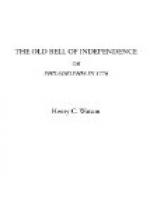“‘I’m nae just free to say,’ replied the stranger, thus rudely interrogated, with the true Scotch evasion.
“‘Answer me at once,’ returned the captain; ‘which party do you favor?’
“’Ye might have the civility to give me a gentle hint which side ye belang to,’ said Sawney.
“‘No circumlocution,’ rejoined the soldier, sternly. ’Inform me immediately: Are you a mercenary of the tyrant of England, or a friend to liberty? your life depends on your answer.’
“‘Aweel, then,’ said the Scotchman firmly, ’sin ye will have it, by my saul, I won’t go to heaven with a lie in my mouth—I’m whig to the back-bone, ye carline; now do your warst, and be hanged till ye!’”
“He might still have been a foe,” remarked Wilson. “He might have seen, from Edwards’ language, that to be a whig was to ensure his safety.”
“I cannot say whether the Scotchman was sincere or not,” replied old Harmar. “The American captain was well pleased to discover a friend, when he had every reason to expect an enemy; and, after furnishing him with a pistol, and advising him to avoid the scouting parties of the enemy, by keeping in the wood, he again proceeded on his expedition. They soon reached a fork in the road: one branch led into the recesses of the wood, and the other lay still farther along the banks of the stream. On arriving at this spot, the captain, calling Lieutenant Brown a little distance from the troop, said, ‘A few miles’ ride will carry us to an encampment of a party of these tories. I wish to reconnoitre the position of the enemy, and shall take the road which leads into the wood, for that purpose, while you with the soldiers will ride on the other road, till you will arrive within sight of the enemy, and then return to this point, which shall be our place of rendezvous. In the meantime, I wish you to avoid coming to any engagement with the tories; but, in case you hear me fire two pistol shots, you may believe me to be in danger, and hasten to my relief.’
“To command was to be obeyed with Captain Edwards, and soon no sound was heard save the slow and regular tread of the horses of the soldiers under command of Lieutenant Brown “Captain Lewis, the partisan tory who had carried off Miss Williams, was an officer of some fame. Of English extraction, and bred in the principles of entire acquiescence in the orders of the British ministry, he beheld the struggles of the colonists with contempt. He saw the inhabitants rising about him in various parts of the country, with feelings of bitter hatred, and he determined to crush these evidences of rebellion in the outset. He accepted a captain’s commission in the English army, and fought for a time under the banners of General Clinton, with success worthy of a better cause. But taking offence at some imperious order of his commander, he threw up his commission in disgust, and retired to his native village near the river Hudson. Here, collecting about him a few choice spirits like himself, he kept the inhabitants in a continual state of alarm by his plundering and rapacious conduct. Acting, as he pretended, under the orders of the king, the tories durst not oppose him, and the whigs were too few in numbers to resist his foraging excursions with any prospect of success.




